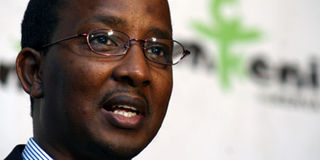Kenya referendum date set

Independent Interim Electoral Commission (IIEC) chairman Ahmed Isaack Hassan during a media breakfast hosted by the United Nations Development Programme (UNDP) at the Hotel InterContinental, Nairobi May 14, 2010. He announced the referendum on the proposed Constitution will take place on August 4, 2010. Photo/WIILIAM OERI
What you need to know:
- Kenyans should expect referendum result two days later, on August 6, says IIEC boss.
IIEC expected to release symbols to distinguish the 'Yes' and 'No' at the referendum.
Kenyans will vote to approve or reject the proposed Constitution on August 4.
The announcement of the referendum date was made by the chairman of the Interim Independent Electoral Commission Ahmed Isaack Hassan Friday.
"More than 50 per cent of the polling stations are located in schools and other learning institutions and we chose the first week of August because they will be closed," said Mr Hassan during a media breakfast hosted by the United Nations Development Programme (UNDP) at the Hotel InterContinental, Nairobi.
"This gives us enough time to frame, train our staff and procure materials."
He said Kenyans should expect the result of the referendum to be out two days later, on August 6.
The move comes just a day after the IIEC published the referendum question that will ask Kenyans: "Do you approve the proposed new Constitution?"
Symbols
The electoral commission is now expected to release symbols that will distinguish the 'Yes' and 'No' at the referendum.
The Committee of Experts is currently carrying out a month-long civic education on the proposed Constitution.
The ongoing voter registration exercise ends on May 21 with 18 constituencies registering people electronically. So far, the IIEC has netted 12.3 million voters.
The IIEC is also expected to announce the campaign period by May 27.
The referendum campaigns will pit two opposing camps, the 'Yes' and 'No' teams that will battle it out to draw Kenyans to their side.
The 'Yes' camp, led by President Kibaki and Prime Minister Raila Odinga are pushing for the adoption of the proposed Constitution at the referendum while the 'No' team composed of a politicians and Clergy have vowed to shoot down the document.
The politicians, largely drawn from the Rift Valley and coalescing around Higher Education minister William Ruto, are opposed to the provisions in the proposed Constitution touching on land and devolution.
Minimum acreage
They are particularly against the clause in the proposed law that sets out the minimum and maximum acreage of land holding.
Article 68 (c) (i) reads: "Parliament shall enact legislation to prescribe minimum and maximum land holding acreage in respect of private land."
The Church objects to the section of Article 26 which empowers doctors to end a pregnancy only if it endangers the woman's life or she needs emergency treatment.
The section reads: "Abortion is not permitted unless, in the opinion of a trained health professional, there is need for emergency treatment, or the life or health of the mother is in danger , or if permitted by any other law."
Christian leaders are also opposed to the retention of kadhis' courts in the proposed Constitution under Article 169 and 170, which limit their authority to disputes over personal status, marriage, divorce or inheritance, where all the parties are Muslims and agree to take the case to a Kadhi.
The proposed Constitution was published last Thursday and according to the Constitution of Kenya Review Act 2008, a 90- day window is set out within which a referendum must be held.
However, the proposed Constitution has stoked controversy after two documents became available to the public, one of which contained an insertion on a clause in the chapter on the Bill of Rights.
Integrity compromised
The words "national security" were inserted to limit the fundamental rights of Kenyans prompting the 'No' camp led by Mr Ruto to call for the suspension of the referendum since the integrity of the process had been compromised.
The correct version of Article 24 (1) (d) reads: "The need to ensure that the enjoyment of rights and fundamental freedoms by any individual does not prejudice the rights and fundamental freedoms of others."
The altered one reads: "The need to ensure that the enjoyment of rights and fundamental freedoms by any individuals does not prejudice national security, the rights and fundamental freedoms of others."
The error was, however, only contained on the official copies produced by The Government Printer and not those inserted in the national newspapers.
If the draft law passes the referendum test, President Kibaki has two weeks to promulgate the new constitution.
During this period, anyone can challenge the result in the Interim Independent Constitutional Dispute Resolution Court.




